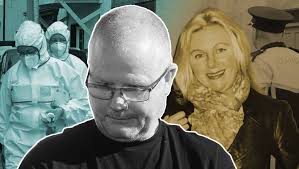Justice Served After 6 Years in Shocking Irish Murder Case
In a case that has horrified Ireland and drawn international attention, Richard Satchwell has been sentenced to life in prison for the murder of his wife Tina Satchwell murder,Tina Satchwell. Her body was found in October 2023—six years after her disappearance—buried in a concealed grave beneath the stairs of their home in Youghal, County Cork Tina Satchwell murder.
The Central Criminal Court in Dublin delivered the sentence after a five-week trial, during which harrowing details emerged about a cold, calculated cover-up by a man who initially claimed Tina had simply vanished.
What Happened to Tina Satchwell?
In March 2017, Tina Satchwell, 45, was reported missing by her husband, Richard. At the time, he told authorities she had taken €26,000 in savings and disappeared. But behind that lie was a brutal truth: Tina had already been murdered, her body hidden in a freezer before being transferred to a makeshift concrete tomb beneath their home.
When Gardaí resumed their investigation in 2023, they discovered the truth beneath the very house she had lived and died in. Her body was wrapped in plastic and buried under the stairs.
A Disturbing Pattern of Control and Deception
Richard Satchwell, a British truck driver originally from Leicester, attempted to control the narrative from the beginning. During the trial, he alleged that Tina attacked him with a chisel and that her death was accidental. He claimed to have panicked, hidden her body, and constructed an elaborate deception.
However, the prosecution dismantled his account, calling it “farcical” and stressing the vast difference in size and strength between the two. At 6ft 2in, Satchwell towered over Tina, who weighed just eight stone (approx. 50 kg). No physical evidence or credible witness ever supported his claims that Tina had a violent temperament.
Jury’s Verdict and Family Reactions
The jury took just under 10 hours to reach a unanimous verdict, concluding that Richard Satchwell intended to kill or cause serious harm to his wife Tina Satchwell murder.
Tina’s cousin, Sarah Howard, addressed the court, saying, “She was murdered by someone who claimed to love her.” She added that the trauma of Tina’s murder and the way her body was disposed of will haunt her forever Tina Satchwell murder.
Her half-sister Lorraine Howard referred to her as Tina Dingivan—her maiden name—and emphasized how Satchwell’s actions were driven by a need for total control. “He wanted her where he could still have the ultimate control – in his home, under the stairs,” she said in a powerful victim impact statement.
Defense Argument and Appeal Intent
Defense counsel Brendan Grehan stated that Satchwell plans to appeal the conviction, maintaining that he “never intended to kill Tina.” The court, however, did not accept this version of events, and the mandatory life sentence was imposed.
Trial Highlights: Misleading Portrayals
Throughout the trial, Satchwell tried to paint his wife as unstable and violent. But this narrative was strongly disputed by family members and discredited due to lack of evidence. Multiple witnesses confirmed that stories of Tina being abusive only began surfacing after she went missing.
“That was not Tina,” said Sarah Howard, who told reporters outside the court that the depiction of her cousin during the trial was “not true to who she was.”
A Broader Conversation on Domestic Abuse
This case is a chilling reminder of how domestic abuse can escalate into fatal violence, often hidden behind closed doors. Tina’s story also underscores the importance of thorough investigations, especially when missing persons cases may involve intimate partner violence.
For six years, Tina’s family endured silence, deception, and media speculation. Today, they finally have legal closure, even if the emotional wounds remain open.
Conclusion
Richard Satchwell’s sentencing may mark the end of a legal journey, but it opens a much-needed conversation about how we respond to domestic abuse, how we support the families of missing persons, and how the justice system must evolve to protect the vulnerable before tragedy strikes.


